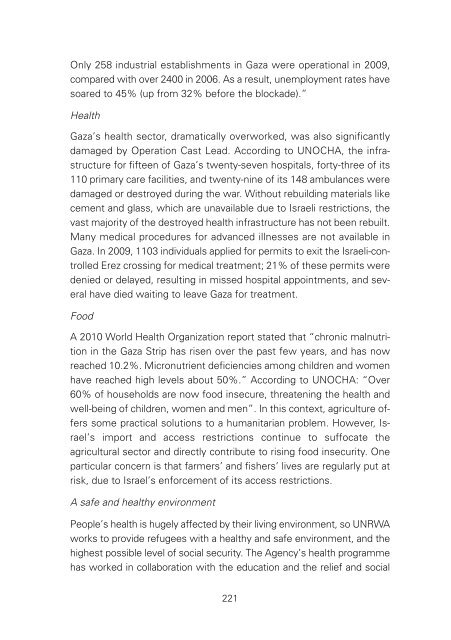The Contribution of Women to Peace and Reconciliation
The Contribution of Women to Peace and Reconciliation
The Contribution of Women to Peace and Reconciliation
You also want an ePaper? Increase the reach of your titles
YUMPU automatically turns print PDFs into web optimized ePapers that Google loves.
Only 258 industrial establishments in Gaza were operational in 2009,<br />
compared with over 2400 in 2006. As a result, unemployment rates have<br />
soared <strong>to</strong> 45% (up from 32% before the blockade).”<br />
Health<br />
Gaza’s health sec<strong>to</strong>r, dramatically overworked, was also significantly<br />
dam aged by Operation Cast Lead. According <strong>to</strong> UNOCHA, the infrastructure<br />
for fifteen <strong>of</strong> Gaza’s twenty-seven hospitals, forty-three <strong>of</strong> its<br />
110 primary care facilities, <strong>and</strong> twenty-nine <strong>of</strong> its 148 ambulances were<br />
damaged or destroyed during the war. Without rebuilding materials like<br />
cement <strong>and</strong> glass, which are unavailable due <strong>to</strong> Israeli restrictions, the<br />
vast majority <strong>of</strong> the destroyed health infrastructure has not been rebuilt.<br />
Many medical procedures for advanced illnesses are not available in<br />
Gaza. In 2009, 1103 individuals applied for permits <strong>to</strong> exit the Israeli-controlled<br />
Erez crossing for medical treatment; 21% <strong>of</strong> these permits were<br />
denied or delayed, resulting in missed hospital appointments, <strong>and</strong> sev -<br />
eral have died waiting <strong>to</strong> leave Gaza for treatment.<br />
Food<br />
A 2010 World Health Organization report stated that “chronic malnutrition<br />
in the Gaza Strip has risen over the past few years, <strong>and</strong> has now<br />
reached 10.2%. Micronutrient deficiencies among children <strong>and</strong> women<br />
have reached high levels about 50%.” According <strong>to</strong> UNOCHA: “Over<br />
60% <strong>of</strong> households are now food insecure, threatening the health <strong>and</strong><br />
well-being <strong>of</strong> children, women <strong>and</strong> men”. In this context, agriculture <strong>of</strong>fers<br />
some practical solutions <strong>to</strong> a humanitarian problem. However, Israel’s<br />
import <strong>and</strong> access restrictions continue <strong>to</strong> suffocate the<br />
agricultural sec<strong>to</strong>r <strong>and</strong> directly contribute <strong>to</strong> rising food insecurity. One<br />
particular concern is that farmers’ <strong>and</strong> fishers’ lives are regularly put at<br />
risk, due <strong>to</strong> Israel’s enforcement <strong>of</strong> its access restrictions.<br />
A safe <strong>and</strong> healthy environment<br />
People’s health is hugely affected by their living environment, so UNRWA<br />
works <strong>to</strong> provide refugees with a healthy <strong>and</strong> safe environment, <strong>and</strong> the<br />
highest possible level <strong>of</strong> social security. <strong>The</strong> Agency’s health programme<br />
has worked in collaboration with the education <strong>and</strong> the relief <strong>and</strong> social<br />
221








